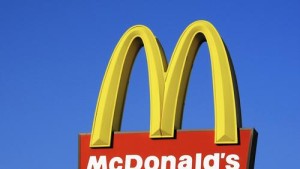There was this one time, in 2010, I got a phone call at 6 a.m. from the esteemed Michael Osterholm of the Minnesota food safety system.
My wife does a better Minnosotan accent, spending her yute in Albert Lea, eh?
 He didn’t like the photo, right, made by the creative couple of Heather and Christian, who used to work in my lab, and opened the conversation with, “How could you print that?”
He didn’t like the photo, right, made by the creative couple of Heather and Christian, who used to work in my lab, and opened the conversation with, “How could you print that?”
I said it was an accurate description of what had been publically known about the leafy greens folks since the E. coli O157 spinach outbreak of 2006 (I’m old, waiting for news on the birth of my third grandson).
He then told me he was a consultant for Fresh Express and that they had an excellent food safety system.
I said great, make it public, so people can judge on their own.
Fresh Express has now been linked to 395 cases of Cyclospora through their lettuce served at McDonalds.
U.S. Rep. Rosa DeLauro, D-Conn., is pressing Food and Drug Administration Commissioner Scott Gottlieb for specifics about the investigation of the cyclosporaoutbreak linked to product sold by Fresh Express.
In an Aug. 3 letter her office released to the media, DeLauro said she wrote the letter “out of concern about the current outbreak of cyclosporiasis as well as the transparency and timeliness of your agency’s ongoing investigation.”
“Although once rare in the United States, parasitic outbreaks caused by cyclospora have become more common over the last several decades,” she said in the letter. “Many of these outbreaks have continually been found to be associated with imported fruits and vegetables.”
The recent outbreak is currently responsible for 395 infections — including 16 hospitalizations — across 15 states.
The parasite was first found when the FDA conducted testing on an unused package of Fresh Express salad mix, distributed to a McDonald’s restaurant, containing romaine lettuce and carrots.
The FDA states as of July 13, McDonald’s decided to stop selling the salads at restaurants impacted in Illinois, Iowa, Indiana, Wisconsin, Michigan. Ohio, Minnesota, Nebraska, South Dakota. Montana, North Dakota, Kentucky, West Virginia and Missouri.
In a July 20, statement, McDonald’s said the health and safety of their customers is their top priority.
 “The health and safety of our customers and the people who work in McDonald’s restaurants is always our top priority. The additional states identified by the FDA and CDC are among the same states where a week ago we proactively decided to remove our lettuce blend in impacted restaurants and replace it through a different supplier. McDonald’s is committed to the highest standards of food safety and quality and we continue to cooperate and support regulatory and public health officials in their investigations. For those seeking additional information about Cyclospora, we encourage them to visit the CDC and FDA websites.”
“The health and safety of our customers and the people who work in McDonald’s restaurants is always our top priority. The additional states identified by the FDA and CDC are among the same states where a week ago we proactively decided to remove our lettuce blend in impacted restaurants and replace it through a different supplier. McDonald’s is committed to the highest standards of food safety and quality and we continue to cooperate and support regulatory and public health officials in their investigations. For those seeking additional information about Cyclospora, we encourage them to visit the CDC and FDA websites.”
Uh-huh.
Cyclospora sucks. My aunt, my mom’s sister, got it in Florida from basil, about a decade ago.
(Doesn’t she look amazing at 80, left.)
Cyclospora isn’t one of those things doctors routinely check for. Then you’re sick for about six weeks until some bright doc figures it out.
The U.S. Department of Agriculture’s Food Safety and Inspection Service (FSIS) issued an alert to the public on “beef, pork and poultry salad and wrap products potentially contaminated with Cyclospora that were distributed by Caito Foods LLC, of Indianapolis,” Indiana.
 USDA also released a public health alert after Indianapolis-based food distributor Caito Foods “received notification from their lettuce supplier, Fresh Express, that the chopped romaine that is used to manufacture some of their salads and wraps was being recalled.”
USDA also released a public health alert after Indianapolis-based food distributor Caito Foods “received notification from their lettuce supplier, Fresh Express, that the chopped romaine that is used to manufacture some of their salads and wraps was being recalled.”
“Fresh Express follows rigid food safety requirements and preventive controls throughout our supply chain that are carefully designed to mitigate against potential health risks. Working together with public health officials, we are hopeful a definitive source of the outbreak clusters will be identified soon.”
Uh-huh.
Still here, Mike. You can call me in Australia through Google voice 785-532-1925 and tell me what Fresh Express is doing, and why they are importing lettuce in the middle of North American summer.









